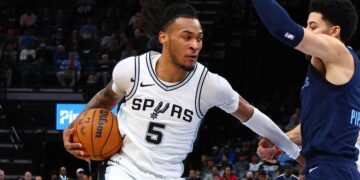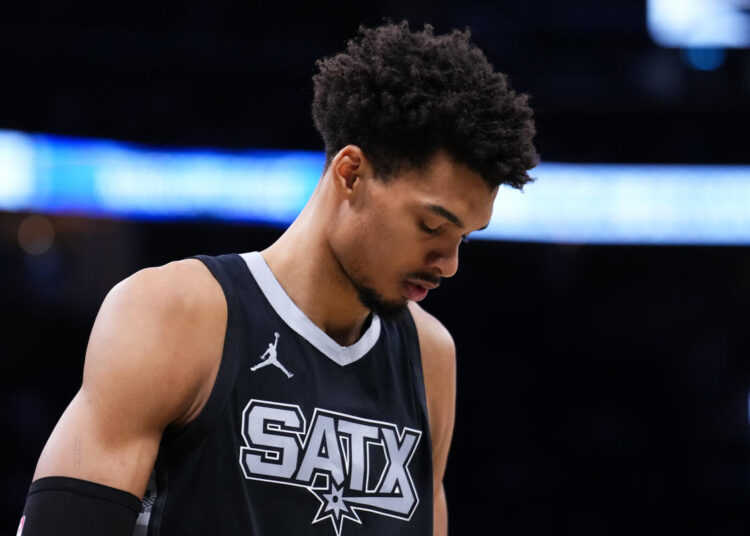The first thing I thought when I saw the Victor Wembanyama news — well, the first thing after the string of unprintable expletives — was, “Please, God, don’t let it be like Chris Bosh.”
A decade ago, Bosh — like Wembanyama, a floor-spacing, everywhere-defending, two-way linchpin for the Big Three-era Miami Heat — was coming off his 10th consecutive All-Star appearance when he complained of abdominal discomfort. After being admitted to the hospital, he was — like Wembanyama — diagnosed with deep vein thrombosis, or blood clots.
While Wembanyama’s deep vein thrombosis was reportedly found in his right shoulder, Bosh’s was found on his lung — a frightening determination that would end his season and cast the rest of his career in doubt. He’d make a brilliant return for the start of the 2015-16 NBA season, playing up to his standard and earning an 11th All-Star nod … only to be forced to pull out of the All-Star festivities due to concerns over another clot, this time in his calf. The second occurrence sent Bosh to the sideline indefinitely, touching off a series of clashes with the Heat over when, or whether, he’d ever be deemed fit to return. He never would.
Bosh failed his Heat physical in September 2016, with team president Pat Riley labeling the star forward’s career as “probably over.” A year later, player and team reached an agreement to part ways; he officially retired in 2019, more than three years after his final appearance. Obviously, such an ending isn’t the worst-case scenario: NBA fans of a certain age might remember that former Portland Trail Blazers great Jerome Kersey died at the age of 52 after a blood clot traveled from his calf to his lung.
Still, though: The prospect of Wembanyama — the brightest new star to grace the NBA sky in a generation, a wellspring of wonderment who at age 21 is just beginning to scratch the surface of his limitless potential — seeing his career preempted sent a shiver down an awful lot of spines on Thursday afternoon.
There was some measure of relief, then, that the second round of sourced reporting following up on the initial news break offered a glass-half-full view of the second-year superstar’s prognosis — a sunnier outlook and potential outcome than the one that greeted Bosh:
Per source, to @TheAthletic, Victor Wembanyama had experienced low energy lately that was causing concern.
When he still had low energy at All-Star weekend, and through his two-day vacation after it, the tests began that ultimately uncovered the deep vein thrombosis. The Spurs…
— Sam Amick (@sam_amick) February 20, 2025
The Spurs are optimistic that Victor Wembanyama will make a full recovery by the beginning of next season, a team source told ESPN.
— Tim MacMahon (@espn_macmahon) February 20, 2025
Here’s hoping that optimism is well-founded — that this is an isolated issue rather than a recurring one, that the Spurs’ medical team and the best specialists money can buy are able to resolve it safely and securely, and that we’ll be seeing Wembanyama at full strength and ready for training camp come September. Because I think all of us would like to see a hell of a lot more of this:
With barely 100 NBA games under his belt, Wembanyama has already firmly stamped himself as one of the most breathtaking and productive game-changers to enter the league in ages. He ends his sophomore season averaging 24.3 points, 11 rebounds, a league-leading 3.8 blocks, 3.7 assists and 1.1 steals per game. Only five other players in NBA history had ever averaged 20-10-3-3-1 for a full season, and only three — Kareem Abdul-Jabbar, Hakeem Olajuwon and David Robinson — had done it more than once. Wembanyama has now done it in each of his first two seasons, and did it while shooting just under league-average from 3-point range on nearly nine attempts per game.
Wembanyama ends the campaign with the fifth-highest block rate in NBA history, rejecting 10.1% of opponents’ 2-point shots during his floor time; only Manute Bol has ever swatted a higher percentage. He’s the first player ever to log at least three made 3-pointers and three blocked shots per game. As of press time, he ranks in the top 10 in the NBA this season in estimated plus-minus — where he’s third, behind only MVP front-runners Nikola Jokić and Shai Gilgeous-Alexander — value over replacement player, box plus-minus, player efficiency rating, ESPN’s wins above replacement, Kostya Medvedovsky’s DARKO, The BBall Index’s LEBRON, Jeremias Engelmann’s xRAPM, and a slew of other advanced metrics.
This is a top-10 player, still years away from entering his prime. That’s not the reason the Spurs should take absolutely every precaution possible to safeguard Wembanyama’s health — they should do that because, y’know, he’s a human person and his life has inherent value irrespective of the labor he produces — but it is a reason. San Antonio hopes to be in the Wembanyama business for decades, and you can’t be too careful when you’re just barely at the outset of something like that; when you’re caring for a forever talent, there’s no reason to rush things.
That said: Wembanyama’s exit does bring a premature end to the preview run of his burgeoning partnership with new arrival De’Aaron Fox, with whom he shared the floor for just 120 minutes. One presumes the Spurs would’ve liked to get a longer look at how they worked together in tandem before Fox becomes eligible for a lucrative contract extension this summer. One also presumes that, if they had any concerns about reaching a mutually beneficial agreement on said extension, the Spurs wouldn’t have been so proactive about going and getting Fox ahead of this month’s trade deadline; with a superstar centerpiece this young, and with a point guard you expect to retain through his prime years, you’ve got all kinds of time.
It also deals a pretty devastating blow to whatever here-and-now hopes the Spurs had heading into the home stretch of the 2024-25 NBA season.
San Antonio enters Thursday’s meeting with the Suns at 23-29, two games behind ninth-place Phoenix, and 3.5 games out of the final play-in spot in the Western Conference, with multiple playoff projection systems giving the team single-digit odds of making the postseason. Considering the Spurs have been outscored by 10.3 points per 100 non-garbage-time possessions without Wembanyama on the floor, according to Cleaning the Glass — a worse net rating than the full-season mark of the 13-42 New Orleans Pelicans — it seems reasonable to conclude that their pursuit of that postseason berth is effectively over. That’s good news for the other Western postseason aspirants, most notably the five teams currently jousting for four play-in spots: the Timberwolves, Mavericks, Kings, Warriors and San Antonio’s Thursday night opponents, the Suns.
It could also come with a cold-comfort fringe benefit for San Antonio, which does own its own first-round pick in the 2025 NBA Draft, and enters Thursday with the 10th-worst record in the NBA.
There’s no way that the 23-29 Spurs could bottom out to such a degree that they wind up rubbing shoulders with the likes of the Wizards, Pelicans, Jazz and Hornets in the race for the highest odds of winning the 2025 NBA draft lottery and coming away with another No. 1 overall draft pick. But dropping down below the 23-32 Trail Blazers would improve their odds of landing a top-four pick by nearly 6.5%; getting underneath the 22-33 Bulls, still somehow in play-in position in the desiccated East, would nearly double their chances. There’s no sunlight bright enough to shine through a cloud as gray as learning that Wembanyama’s season is over; adding another high lottery pick to the core of Wembanyama, Fox, Stephon Castle, Devin Vassell, Jeremy Sochan and Co., though, would at least represent something of a silver lining.
The impact of the end of Wembanyama’s season will be felt outside of San Antonio, too — not only in what you’d imagine would be at least slightly diminished interest in catching the Spurs when they come through your city on a road trip, but also in what should be a pretty substantial shuffle on year-end award ballots.
Wembanyama finishes with just 46 games played, meaning he’ll fall short of the 65-game threshold for awards eligibility. Even given the Spurs’ sub-.500 record, he had an excellent chance of landing one of the 15 All-NBA spots; now, that slot will remain open to other candidates whose statistical résumés might’ve been blotted out by the sheer totality of what Vic put on the box score night after night. He was also a mortal lock for an All-Defensive First Team slot, and an overwhelming favorite to win Defensive Player of the Year after finishing second to countryman Rudy Gobert last season; his removal from consideration throws that race wide open, with a slew of candidates likely to get a fresh look from prospective voters over the final third of the season.
On one hand, whoever winds up winning that award will deserve all the praise he receives; on the other, we’ll all know that the victory was conditional, a product of grim circumstance. As much as anything else — the dominance of the Thunder and Cavaliers, the rise of the Rockets and Pistons, Luka to the Lakers, whatever — Victor Wembanyama’s ascent to no-doubt-about-it All-Star (and presumably All-NBA, and DPOY, etc., etc.) status as the unicorn to end all unicorns was the feel-good story of this NBA season. The bad news is that this chapter ended so abruptly and bitterly. The good news, though: From the sound of it, the story ain’t over, and come September, we’ll get to watch Vic start writing a new chapter.
Read the full article here



























Discussion about this post